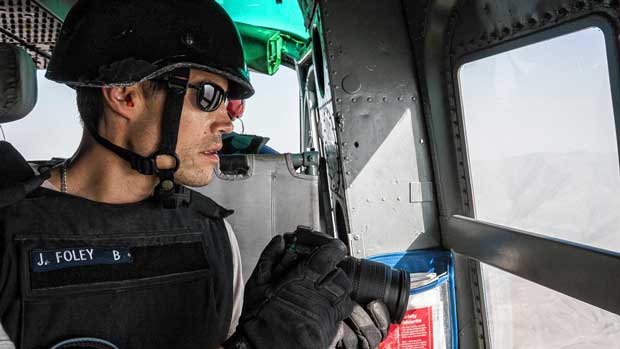
“James Foley was the oldest of five children,” recalls his mother Diane Foley. “Jim touched many lives. I truly had no idea as a mom how many lives he touched.”
On Thanksgiving Day in 2012, James, an American teacher turned freelance conflict journalist, was kidnapped and taken hostage by ISIS radicals while reporting on the Syrian Civil War. James was routinely tortured at the hands of his captors and was held for ransom along with other conflict journalists from America and around the world. While many Europeans countries eventually negotiated for the return of their citizens, the United States maintained its policy in refusing to negotiate with terrorists. Nearly 2 years after being kidnapped, James was heinously murdered by his captors, sparking debates on international safety and America’s hostage protocols. However, for James’ family, friends, and colleagues, and for those who eventually learned of his story, the young reporter who believed wholeheartedly in the power of human rights would be remembered by much more than his death.
“Jim really aspired to be a man of moral courage,” stated Diane.
“It was really after Jim’s murder that we wanted to try to find a positive way to continue Jim’s legacy.”
One month after James’ death, Diane and her family established the James W. Foley Legacy Foundation to not only honor the brave work of their son and brother in reporting the atrocities of the Syrian Civil War but to also “advocate for the return of all Americans who are unjustly detained or kidnapped abroad” explained Diane, who also serves as the foundation’s President.
The organization strives to protect and advocate for journalists who risk their lives to relay human rights issues present within conflict-ridden areas, such as Syria, parts of Africa, and North Korea. Working with journalism schools, the James Foley Foundation developed a journalist safety curriculum to help young reporters remain safe while working abroad. The foundation was involved in the founding of ACOS, A Culture of Safety Alliance, a coalition that works to implement safety practices for journalists and news organizations across the world.
“They’re very important partners in our endeavors to protect the freelancers,” said Diane of the ACOS Alliance.
In addition to encouraging prospective journalists to follow important safety practices, the James Foley Foundation works with the US government and other nonprofits to improve the complex process of returning hostages and detainees to America. In many instances, journalists and other Americans are either kidnapped by terrorist groups or are held for political reasons by foreign governments without diplomatic relations. Due to America’s terrorist negotiation policy, families across the county are often left with little help in bringing their loved ones home.

“I was appalled, really, at how little our government was able to do to help bring Jim home,” said Diane.
“It can be a very isolating experience for a family.”
In recent years, the foundation has increased outreach to assist families and make lasting changes on Capitol Hill. Shortly after James was killed, President Obama ordered a complete review of hostage protocols and began to alter policies on how the government can communicate with families of hostages. While the Trump administration is increasing efforts to safely return hostages to their loved ones, Diane and the foundation continues to work tirelessly to build partnerships in order to address this growing issue. Along with the Ford Foundation, the Foley family contributed to the nonprofit Hostage US to work confidentially with hostage families and provide them with legal, financial, and psychiatric resources.
As the James W. Foley Legacy Foundation nears its 5th anniversary, Diane and her team are seeking to grow their efforts in assisting hostages and detainees. The foundation recently hired an executive director to work full-time in Washington DC on hostage advocacy and to raise more social awareness about the work of conflict journalists who risk their lives to “bring home the truth,” explained Diane.
James’ legacy continues to motivate and inspire hundreds of individuals every year though the foundation’s events and fundraisers. Every year on James’ birthday, the foundation hosts its James Foley Freedom Run where about 2,000 runners across the US and the world raise awareness on hostages who have yet to be freed from their captors. Annually in the springtime, the foundation also unites families, government officials, and journalists during its James W. Foley Freedom Awards ceremony to celebrate individuals who work to promote a free press worldwide.
Along with the foundation that bares his name, James’s story continues to indelibly impact individuals and communities across the world. Directed by his childhood friend Brian Oates, the documentary Jim: The James Foley Story focuses on the reporter’s desire to relay stories of human suffering in order to enact lasting changes. The film received critical praise for addressing the often under-reported dangers Americans can face within conflict-ridden countries and is even used in the foundation’s safety curriculum for journalists.

“I think a lot of Americans are very unaware of how much Westerners, particularly Americans, can be targeted when we are traveling abroad,” explained Diane.
“It certainly shows the risks of being a conflict journalist and then the difficulties of bringing a hostage home…I hope it challenges all of us to do better.”
Through the documentary and the surrounding work linked to his name, James’ legacy reminds individuals that heroism comes from the innate desire to improve life for others.
“There’s physical courage… for some reason, I have physical courage,” James said as documented in the film.
“But really if you think about it, that’s nothing compared to moral courage…If I don’t have the moral courage to challenge authority, to write about things that are going to maybe have reprisals on my career, if I don’t have that moral courage, we don’t have journalism.”
Learn more about the James W. Foley Legacy Foundation and Donate.
[/vc_column_text][/vc_column][/vc_row]